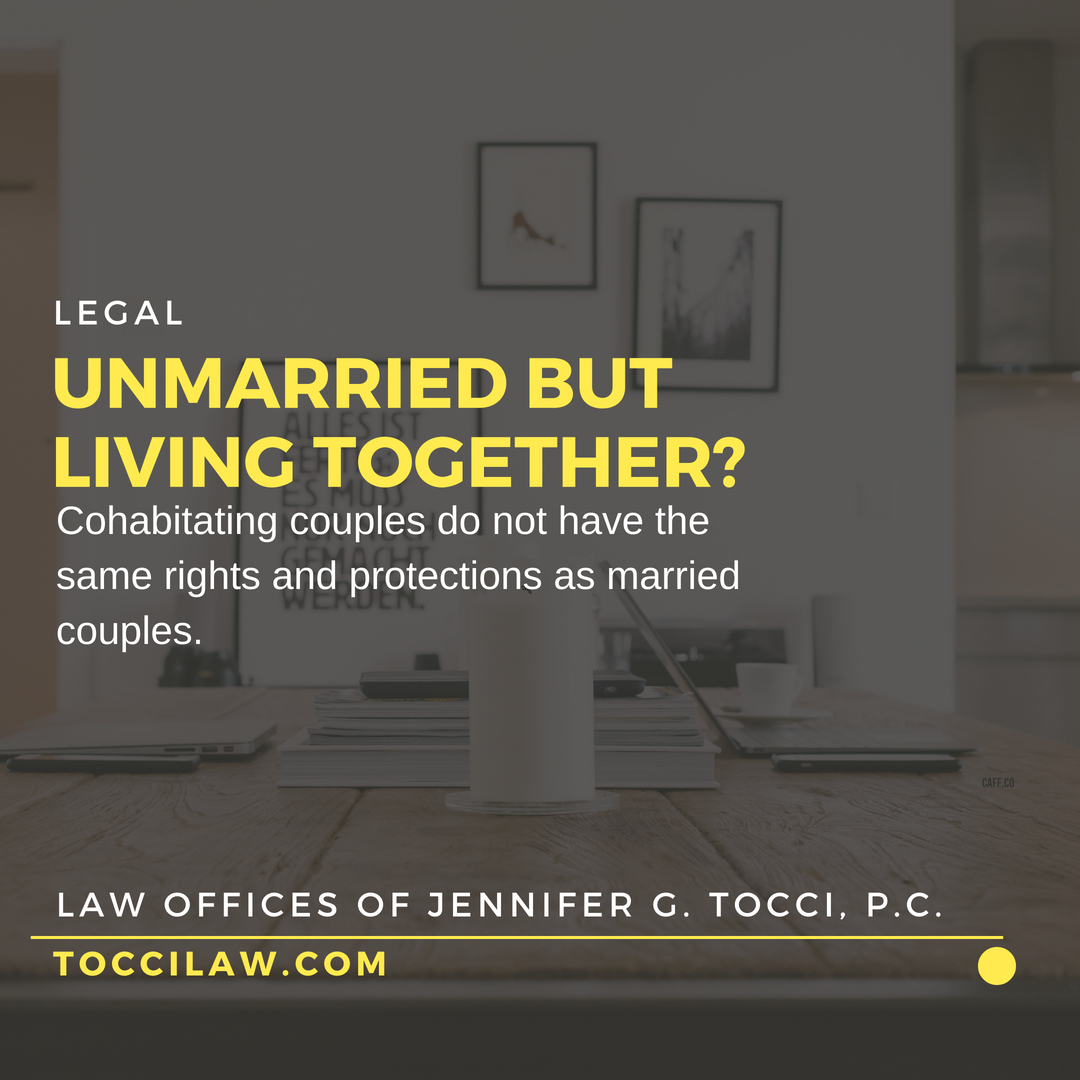Cohabitating couples do not have the same rights and protections as married couples. Married couples own property differently than cohabitating couples. (Sidebar: There is no common law marriage in New York, and no matter how many years you live with your significant other, it will not change your marital status.) Many of my clients report that they have agreed (usually via unenforceable handshake) on how they will split property in the event of a breakup; however, those same couples do not have any protections in the event one of the passes away or becomes incapacitated. I hear things like, “We’re not worried; we’ll get married before we have to think about those things.” Unfortunately, not knowing your rights and properly planning for your death and/or incapacity can leave your significant other in a mess.
The hard reality is that if you or your significant other passes away, neither of you will be able to inherit the other’s property. Further, without being vigilant, a surviving significant other may find him/herself without ownership of his/her own property.
Below are a few things to think about. Keep in mind every single situation is different. If you think you may be in need of estate planning, you should speak with an attorney.
Houses/Real Property:
When married couples purchase property, they usually own it as “tenants by the entirety.” This means that each person owns 100% of the property and if one spouse dies, the other spouse by operation of law (automatically) owns 100% by his/herself. Frequently, when one party of an unmarried and cohabitating couple dies, the surviving party does not inherit ownership of the entire property. At times, unmarried and cohabitating couples do not own the same share of the property as each other. In either event, you could find yourself sharing your home with his/her parents, siblings, children, and other heirs.
What can you do to make sure your home passes according to your wishes? If you haven’t purchased the property yet, you can speak with an attorney about your purchasing options to make sure that your property will pass the way you wish. Alternatively, you can make a will to ensure that your property passes to the person(s) of your choosing.
(Sidebar: subsequently getting married after purchasing property as an unmarried couple may not “fix” the situation.)
Medical Emergencies:
Unmarried and cohabitating couples often have the relationship of a married couple. If they were to become incapacitated, ill or injured, they would want their significant other making healthcare decisions on their behalf. However, without being married or having proper estate planning, your adult children, parents, siblings and other relatives will legally be able to make healthcare decisions on your behalf before your significant other. Many hospitals and healthcare facilities will not disclose important medical information to unmarried significant others without proper documents.
During periods of incapacity, your unmarried significant other will likely not be able to make important financial decisions on your behalf without a power of attorney designating him/her as an agent. Again, your adult children, parents, siblings, and other relatives may be making decisions for you where needed. In certain cases, such as gaining access to bank accounts, running businesses, paying bills could be nearly impossible for any person without proper documentation.
Bank Accounts/ IRAs/ CDs/ Stock Accounts, etc.:
If bank accounts are not joint accounts, bank accounts in one party’s name will not pass to their unmarried significant other without proper wills and beneficiary designations. The same goes for IRAs, CDs, stock accounts and other investments.
Life Insurance Policies:
If there is no named beneficiary on life insurance policies, without a will this policy will not pass to a significant other.
Personal Assets:
Your personal property, such as cars, clothing, and other belongings will not pass to your significant other without proper documentation. In the event your significant other passes away, you could find yourself in a situation where items you’ve paid for or contributed to the purchase of are not legally yours.
(Sidebar: estate planning may also be used to ensure that your unmarried significant other does not inherit all or select portions of your property. Sometimes there are important reasons you have not tied the knot.)
What Should You Consider?
If you are unmarried but cohabitating with your significant other, your attorney will be able to evaluate what you own, together and separately, and construct a will, deed, and other documents to make sure your wishes play out.
If you’re unmarried but cohabitating, you should consider:
- Drafting and executing your Last Will & Testament
- Executing a Power of Attorney
- Designating a Healthcare Proxy
- Designating beneficiaries where necessary
Depending on what you own and how you own it, you will have specific needs to allow your property to pass as you wish. For personalized advice and planning, call the Law Offices of Jennifer G. Tocci, P.C., for a free 30-minute consultation (631) 343-7676.
Attorney Advertising. This blog post is designed for general information only. The information presented at this site should not be construed to be neither formal legal advice nor the formation of a lawyer-client relationship. Prior results do not guarantee a similar outcome. New York State only.










